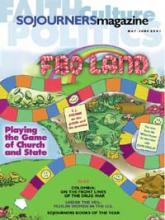In the short period since the new White House Office of Faith-Based and Community Initiatives was established, most of the nation has learned the meaning of a new term—FBO, which stands for "faith-based organization." Until recently, most of those working out of local churches and religiously affiliated organizations to solve the problems of poverty and violence didn't even know they were "FBOs."
But despite the flurry of news headlines and media stories, much of the public is still confused about the issues at stake in this discussion of religion and public life. We have been bombarded with both polemics and fear, from the Left and the Right, when what we need is a healthy debate about how new civic partnerships between FBOs and government on all levels should and should not be forged.
We have heard alarming predictions of how the wall of separation between church and state is about to be torn down, or of massive secular conspiracies to discriminate against the religious. Some say churches will have to deny their faith to receive public funds, and others claim overzealous evangelical groups would use government money to proselytize Jews or vulnerable homeless people.
We're either about to turn into a theocracy, if you listen to critics on the Left, or into a government that refuses to let church groups help the needy because of "Christophobia," if you heed the charges from the Right. Will witches, cults, and strange religions soon get taxpayers' dollars? Will effective church-related programs be strangled by government bureaucracy? Will government abdicate all its responsibilities and leave hopelessly under-resourced churches and charities to fight poverty on the cheap by forcing them to make bricks with straw?
Read the Full Article
